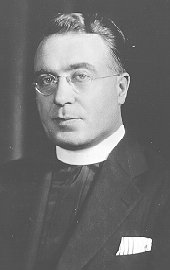Father Charles E. Coughlin

Father Coughlin first took to the airwaves in 1926, broadcasting weekly sermons over the radio. By the early 1930s the content of his broadcasts had shifted from theology to economics and politics. Just as the rest of the nation was obsessed by matters economic and political in the aftermath of the Depression, so too was Father Coughlin. Coughlin had a well-developed theory of what he termed "social justice," predicated on monetary "reforms." He began as an early Roosevelt supporter, coining a famous expression, that the nation's choice was between "Roosevelt or ruin." Later in the 1930s he turned against FDR and became one of the president's harshest critics. His program of "social justice" was a very radical challenge to capitalism and to many of the political institutions of his day.
Father Coughlin was an early and passionate supporter of President Roosevelt, since he viewed FDR as a radical social reformer like himself. Roosevelt's rhetoric during his inaugural address implicitly promised to "drive the money changers from the temple." This was music to Coughlin's ears since a core part of his own message was monetary reform. Roosevelt's early monetary policy seemed to fulfill this promise and so Coughlin viewed him as the savior of the nation. But when FDR failed to follow-on with additional radical reforms, Coughlin turned against him. By 1936, he would support a third-party candidacy against FDR's reelection bid and would even say this of Roosevelt:
"The great betrayer and liar, Franklin D. Roosevelt, who promised to drive the money changers from the temple, had succeeded [only] in driving the farmers from their homesteads and the citizens from their homes in the cities. . . I ask you to purge the man who claims to be a Democrat, from the Democratic Party, and I mean Franklin Double-Crossing Roosevelt."
Father Coughlin's influence on Depression-era America was enormous. Millions of Americans listened to his weekly radio broadcast. At the height of his popularity, one-third of the nation was tuned into his weekly broadcasts. In the early 1930s, Coughlin was, arguably, one of the most influential men in America. Although his core message was one of economic populism, his sermons also included attacks on prominent Jewish figures--attacks that many people considered evidence of anti-Semitism. His broadcasts became increasingly controversial for this reason, and in 1940 his superiors in the Catholic Church forced him to stop his broadcasts and return to his work as a parish priest.
http://www.ssa.gov/history/cough.html


